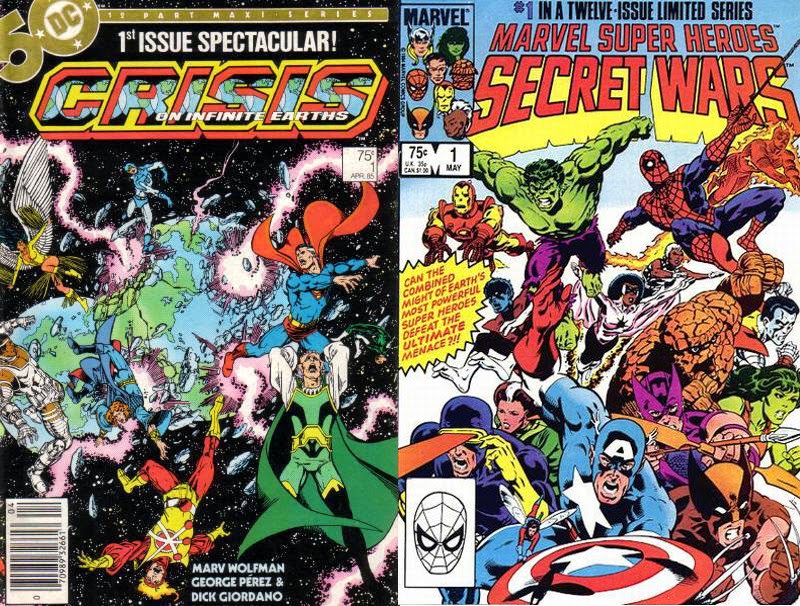Comic books have always been my thing. I got into them before I could even read. When I was still a toddler, my parents owned a couple of convenience stores, and they had those wonderful, mythical spinner racks in them. The draw of the brightly colored comics was too much for my young mind, and I was hooked. Even before I could read them.
I really don't know what the first comics that I "read" were, but from vague childish memories I am pretty sure that
The Avengers was on that list, most likely (due to my age) something during the Roy Thomas years.
Within a few years, I was going full tilt into comics. The 70s were a great time to get into comics.
Marvel was doing some of the best work of their history with creators like Roy Thomas, Steve Englehart, Gerry Conway, Steve Gerber, Neal Adams and Jim Starlin among so many others. I do think that
DC Comics came along and stole a lot of the thunder of
Marvel in the 80s and 90s, with more cutting edge storytelling, but that is a matter of opinion.
I love comics. I love all sorts of comics. I love mainstream super-hero stuff. I love alt comix. I love the indie books (stuff from the 80s...wow). I love the foreign stuff. France has had some great SF comics over the years.
2000 AD and/or Pat Mills have revolutionized the British comics scene. If you have an interest in a genre or type of storytelling, there is probably a comic for it. And that is an awesome thing.
This is where I have always fallen a little out of step with other gamers, I'm just not as big of a fan of fantasy or SF stuff as I have been of comics. Luckily there's always been a strong fantasy tradition in comics (whether any number of
Conan comics or quirkier fare like
Stalker from Paul Levitz and Steve Ditko), so I've had that to keep me afloat, but I have never really had much of an interest in fantasy literature outside of a couple of authors. I tried some of the "Appendix N" writers with mixed success.
Then in 1985, I stopped playing
D&D. It has just never really engaged me in the way that other games have since. Although at the time, if it hadn't been for the original
Marvel Super-Heroes game and
Call of Cthulhu, I may have stopped gaming altogether.
The
Marvel game not only appealed to my being a fan of comics (even though by the time the game came out I had switched my allegiance to
DC Comics), but it had that breathtaking simplicity that people talk about when they wax nostalgic over the early editions of
D&D. Yes, there were other super-hero RPGs, but the only other that was as fun for me would have been the British
Golden Heroes, put out by
Games Workshop in the later 80s. The sensibility of that game was so in sync with the British comics of the time, and the American comics that they would later inspire, that the game was really ahead of its time.
There was also the college fling with
Palladium's Heroes Unlimited, a game that I also have enjoyed over the years, but only when I need that "class and level" scratch itched.
Why is it that I keep coming back to the
Marvel RPG? I think that it hits that personal sweet spot of simplicity and robustness. The game's underlying mechanics look back to an earlier era where a more freeform and imaginative route was encouraged, in that time before people thought that something not addressed directly by the rules of a game meant that the game couldn't do that thing. But mostly, I like the fact that comics, and super-hero comics more specifically, are about just about anything: science fiction, romance, adventure fiction, mythology, horror, magic, intrigue, espionage. All of these things are in super-hero comics, and all of those things can and should be in super-hero RPGs. A good super-hero RPG can be about anything, and for me that is what the Classic
Marvel Super-Heroes RPG is. A good super-hero RPG that can do anything.
I'm not going to lie and say that it is a perfect RPG. There's no such animal. What it is, however, is something that is nearly perfect for me. It has flexibility and variety. It holds up fairly well at the high and low ends of the power spectrum for super-heroes. Most super-hero RPGs, I think, hold up better at the higher end of things than the "street level," but there are work arounds for a game like this, and that is why I like it.
It has a good framework that I can hack into the game that I want at the table. That is really all that I can ask out of an RPG.
It is true that this game gave my friends and I hours and hours of enjoyment back in college. Everything from random, stupid fights to intricate intercharacter interactions. The rules didn't always support what we wanted to do, but they didn't get in the way of them either. And that, for me, is the point behind an RPG.












